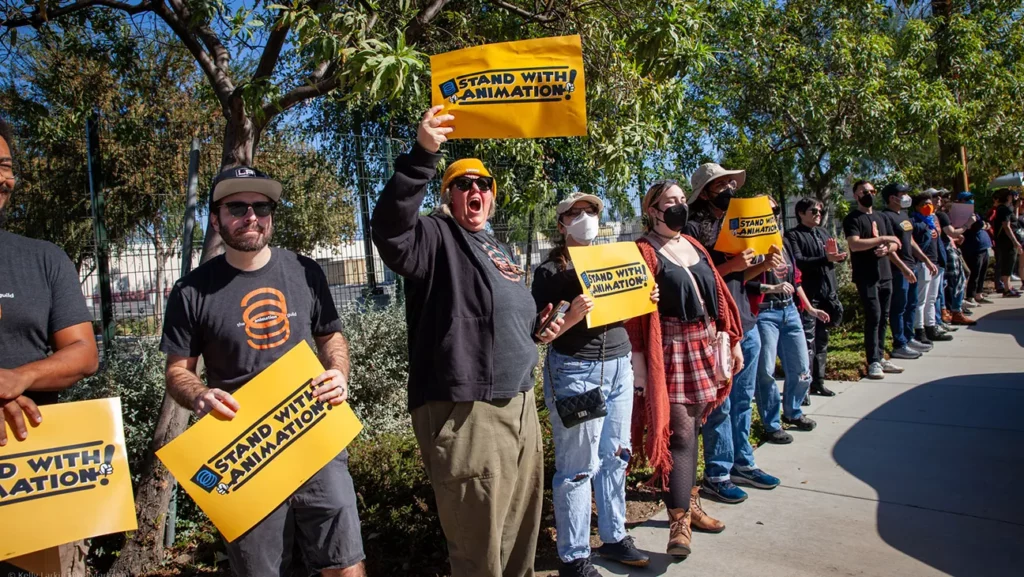In November of last year, facing the longest period of unemployment she’d ever known, Paulina Williams seriously considered leaving the entertainment profession.
The veteran reality television executive producer and showrunner with approximately 20 years of experience on projects such as Laguna Beach: The Real Orange County and Big Brother recalls her husband asking her at some point, “Why don’t you try to do something that you’ve always wanted to do but never had a chance?”
She replied, “Honey, this is something I’ve always wanted to do. I’ve spent my entire career working at my dream job.
Hollywood has long been rife with young creatives who work side jobs — waiting tables, driving Ubers — to support themselves until they can earn a respectable income in the industry. But now, amid a hard and sustained downturn in the entertainment industry, a twist on that rite of passage is taking place. Workers who have already established success and experience in the industry are seeking for outside job as a stopgap, side hustle, or long-term solution.

The evidence on how Hollywood has cut back over the last few years is striking. Employment in California’s film, television, and sound business fell about 30% during the first quarters of 2022 and 2024, a period marked by two crushing strikes and the collapse of the streaming bubble, according to Otis College of Art and Design research. This year, output levels continue to lag behind their pre-strike highs. On-location filming in the Los Angeles area fell more than 36% in the third quarter of 2024 compared to the five-year average, while a ProdPro report found that production volume in the United States fell 35% in the third quarter of 2024 compared to the same period in 2022 (prior to the strikes).
READ MORE: Jason Lee, The Founder Of Hollywood Unlocked, Was Elected To The Stockton City Council
Faced with these challenges, some professionals are retooling their résumés from a traditional production format, which assumes the reader’s familiarity with the industry and frequently includes lengthy lists of credits, to a more corporate layout that briefly describes responsibilities and highlights specific skills developed. They’re explaining what certain responsibilities on set or in industry headquarters mean to employers who don’t understand entertainment. “When you say, ‘I work in development,’ they think you’re a fundraiser,” says former casting and development executive Lauren Kotlen, who has been working perma-freelance since November 2023 and is looking for content development and talent-relations opportunities in marketing, advertising, and digital media firms. Reasons Williams, “If I’m a showrunner, what do I do? Well, we are project managers. Every producer is a project manager on some level.” (As a result, Williams completed a Project Management Professional certification course during her job search.)

Other job seekers are asking if having entertainment credits on their resumes improves or damages their prospects of obtaining work. Some have noted hesitation on the part of certain employers because of their showbiz backgrounds, which they attribute to a belief that they are only searching for temporary positions during the contraction. Sidnee Lewis-Avila (The Hills: New Beginnings), a 24-year-old production manager, was questioned during an interview for a Whole Foods overnight restocking position, “What happens if you get a call for a show or the industry bounces back?” She clarifies: “They fear that I’m going to put in my notice and bounce.” (Lewis-Avila recently worked in concessions at Universal Studios Hollywood’s Halloween Horror Nights with the purpose of completing a probationary term so she could apply for backlot employment at the studio.) Beth Kushnick, a well-known set decorator with credits on The Good Wife and Fringe, has long worked part-time jobs in addition to her production work; she is currently doing interior design for private clients, staging apartments, and planning an upcoming event for a commercial business in the absence of industry jobs. However, she reportedly stated, “I was up for a very big job out east, and they were afraid that I was going to get a movie.”
READ MORE: Hollywood’s Massive Boom Has Collapsed
Elena Muslar, managing director of the Entertainment Community Fund Career Center, has seen entertainment workers react to issues like these by omitting their business experience, resulting in gaps in their résumés. Muslar suggests that ECF Career Center members modify their descriptions of past experiences to any field they want to enter in their résumés. Rather of beginning with, “I’m an actor” who will need time off, she proposes a performer describe themselves as a type of entrepreneur.

Employees who decide to leave the company may face emotional challenges, even if they are not departing completely or permanently. “I think the biggest challenge is more about people’s mindset,” says Christina Blumer, executive director of the Will Rogers Motion Picture Pioneers Foundation, which provides career counseling and retraining grants to professionals in the theater exhibition, distribution, and vendor spaces. “People believe that ‘I work in the movie industry and this is what I do.’ It might be difficult for people to let go of emotional attachments and acknowledge that circumstances have changed.
READ MORE: Tim Burton Is Honored With A Star On The Hollywood Walk Of Fame
However, entertainment workers also bring unique qualities to the job search. Workers from Hollywood may already be focused on expanding their personal networks: “They always say, ‘It’s who you know in Hollywood.'” “It’s who you know anywhere,” Kotlen explains. They contribute a “creative skill set,” according to ECF’s Muslar. Project management, digital marketing, creative direction, teaching artistry, arts administration, and other sorts of content creation are currently in high demand, according to Muslar, all of which can transfer skills learned in the entertainment industry.

For over a year, Kaitlin Saltzman, the head of writing at Wilmer Valderrama’s production business WV Entertainment, has performed a side hustle to supplement her day job. During the twin strikes in 2023, when she witnessed friends getting laid off and had a lot more free time, the executive chose to pursue both a pastime and an additional professional skill set. She ended herself resuming a hobby she hadn’t done since high school: photography. Saltzman now shoots clients on weekends and edits her photographs after her children have gone to bed. She describes her photography and executive work as “visual storytelling.” I really aim to capture people in my images, and I believe that my profession in television has a lot to do with it.”
Veteran makeup artist Alexis Walker (Just Go With It, Knocked Up) has recently launched a business as a professional coach, with a particular emphasis on Hollywood employees wishing to change careers. In her work, she discovered two primary themes: clients looking for ways to apply their expertise in a new industry and achieving a “balancing act of straddling two worlds” — continuing to do some Hollywood work while creating an external business. She is also the creator of The Hollywood Second Act Club Podcast, which features interviews with industry insiders who have followed careers outside of regular film and television work.
In her opinion, the immediate reaction to this delay was “sitting-duck stunned for a long time, blindsided and paralyzed, understandably.” She continues: “I think you’re going to start seeing a lot more inspired action as people come awake to the moment and what that means for them.”
Radiant TV, offering to elevate your entertainment game! Movies, TV series, exclusive interviews, music, and more—download now on various devices, including iPhones, Androids, smart TVs, Apple TV, Fire Stick, and more.


